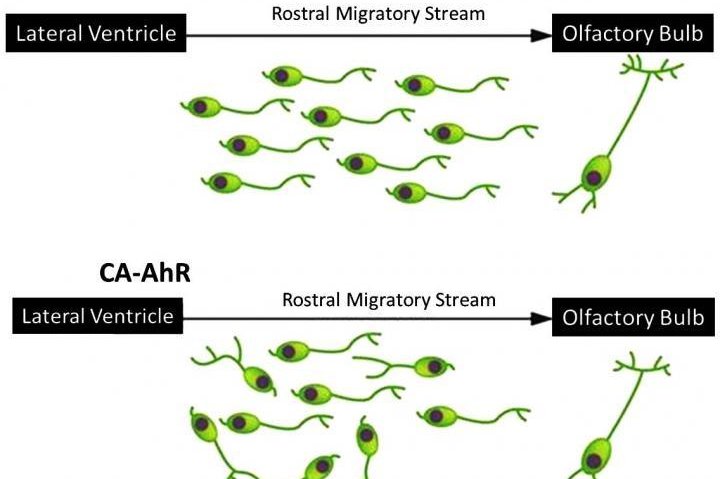An illustration shows how dioxin-induced excessive AhR signaling disrupts normal brain development and nueron migration. Photo by University of Tsukuba
TSUKUBA, Japan, June 14 (UPI) -- A new study published in the journal Nature shows dioxins disrupt brain development in mice, affecting the rodents' emotion, learning, memory and sociality.
Dioxins are a class of environmental pollutants characterized by their high toxicity and longevity, which allows them to accumulate in fat cells in the human body.
Research has previously linked the toxins to cancers and problems with the human immune and nervous systems. Studies have also shown that dioxins bind readily with a transcription factor protein called aryl hydrocarbon receptor, or AhR.
But until now, scientists hadn't been able to uncover the role of AhR and how dioxins might interfere with its performance.
Scientists in Japan speculated that dioxins encourage AhR activation, and decided to test the effects of excessive AhR signaling in mice. The researchers' findings suggest dioxins' AhR interference affects cellular migration and neurite growth.
"We speculate that disrupted AhR signaling is the underlying mechanism of dioxin's developmental neurotoxicity," study co-author Eiki Kimura, a neuroscientist at the University of Tsukuba, said in a news release. "Indeed, we found that excessive activation of AhR signaling slowed the migration of neurons from their origin to their final position in the brain, which is a critical process for normal brain development."
Neuron migration is controlled by several proteins, the levels of which are dictated by AhR signaling. Previous studies have shown mice and other animals exposed to dioxins show signs of abnormal development and exhibit changes in emotion, learning, memory and sociality.
"The delayed development of migrating neurons, which was caused by excessive AhR signaling, may partially explain dioxin-induced abnormal behavioral alterations previously reported in laboratory animals," added co-author Chiharu Tohyama. "Further studies on the relationship between AhR signaling and cytoskeleton regulation will deepen our understanding of the mechanism of AhR-dependent toxicity."















